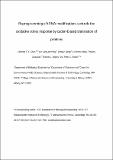Reprogramming of tRNA modifications controls the oxidative stress response by codon-biased translation of proteins
Author(s)
Chan, Tsz Yan Clement; Pang, Yan Ling Joy; Deng, Wenjun; Indrakanti, Ramesh Babu; Dyavaiah, Madhu; Begley, Thomas J.; Dedon, Peter C.; ... Show more Show less
DownloadDedon_Reprogramming.pdf (3.334Mb)
PUBLISHER_POLICY
Publisher Policy
Article is made available in accordance with the publisher's policy and may be subject to US copyright law. Please refer to the publisher's site for terms of use.
Terms of use
Metadata
Show full item recordAbstract
Selective translation of survival proteins is an important facet of the cellular stress response. We recently demonstrated that this translational control involves a stress-specific reprogramming of modified ribonucleosides in tRNA. Here we report the discovery of a step-wise translational control mechanism responsible for survival following oxidative stress. In yeast exposed to hydrogen peroxide, there is a Trm4 methyltransferase-dependent increase in the proportion of tRNA[superscript Leu(CAA)] containing m[superscript 5]C at the wobble position, which causes selective translation of mRNA from genes enriched in the TTG codon. Of these genes, oxidative stress increases protein expression from the TTG-enriched ribosomal protein gene RPL22A, but not its unenriched paralogue. Loss of either TRM4 or RPL22A confers hypersensitivity to oxidative stress. Proteomic analysis reveals that oxidative stress causes a significant translational bias towards proteins coded by TTG-enriched genes. These results point to stress-induced reprogramming of tRNA modifications and consequential reprogramming of ribosomes in translational control of cell survival.
Date issued
2012-07Department
Massachusetts Institute of Technology. Center for Environmental Health Sciences; Massachusetts Institute of Technology. Department of Biological Engineering; Massachusetts Institute of Technology. Department of ChemistryJournal
Nature Communications
Publisher
Nature Publishing Group
Citation
Chan, Clement T.Y. et al. “Reprogramming of tRNA Modifications Controls the Oxidative Stress Response by Codon-biased Translation of Proteins.” Nature Communications 3 (2012): 937.
Version: Author's final manuscript
ISSN
2041-1723